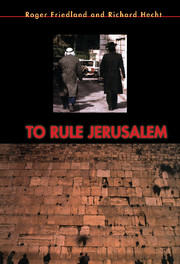Book contents
- Frontmatter
- Contents
- List of Illustrations
- Preface
- Acknowledgments
- Introduction
- 1 A Fearful Fusion
- Part I The Two Zions: Jews Against Zionism in Jerusalem
- Part II Zion Divine: Jerusalem as the Messianic Central City
- 6 A Few Footsteps for the Messiah
- 7 Staking the Claim in Judea and Samaria
- 8 Building the Capital
- 9 Suburbs of the Messiah
- 10 Defensible Borders
- Part III Birth of a Nation
- Part IV Heart of Stone
- Notes
- Index
6 - A Few Footsteps for the Messiah
Published online by Cambridge University Press: 13 May 2010
- Frontmatter
- Contents
- List of Illustrations
- Preface
- Acknowledgments
- Introduction
- 1 A Fearful Fusion
- Part I The Two Zions: Jews Against Zionism in Jerusalem
- Part II Zion Divine: Jerusalem as the Messianic Central City
- 6 A Few Footsteps for the Messiah
- 7 Staking the Claim in Judea and Samaria
- 8 Building the Capital
- 9 Suburbs of the Messiah
- 10 Defensible Borders
- Part III Birth of a Nation
- Part IV Heart of Stone
- Notes
- Index
Summary
In 1967, Israel won a war and power over new places. The Jewish state finally controlled Jerusalem, indeed all the lands the United Nations had laid out in 1947 as a Palestinian state. These captured spaces provided strategic depth and bargaining chips for the negotiations Israel believed would soon follow. But the soils of war were also symbols with a power all their own.
Conquest can transform the conqueror. In this case, Israel's victory and the failure of the vanquished to sue for peace set in motion social forces that transformed Israel's political culture, its understanding of itself and its place in the family of nations. Those, religious and secular, who believed in the Jews’ singularity – that Israel could not and should not be like other nations – came forward to take the land.
Zionism had been a largely secular affair, grounded in a belief that statehood would birth a new people, an exemplary, but normal nation, who would take its appointed place in the region and the world. Judaism was a cultural fact, not the metaphysical basis of statehood. But two decades after Israel declared a state in a Tel Aviv movie theater, Israel's 1967 victory ignited the fires of messianism. A marginal group of rabbis whom David Ben-Gurion had brought inside the state were able to reactivate the messianic meanings of the land and its settlement that had so moved the Jews of the old yishuv. These men and women did more than build houses and roads. Fired by God's historical instruction, the religious nationalists captured the commanding heights of a oncesecular, but territorially maximalist Revisionist Zionism.
- Type
- Chapter
- Information
- To Rule Jerusalem , pp. 143 - 162Publisher: Cambridge University PressPrint publication year: 1996

